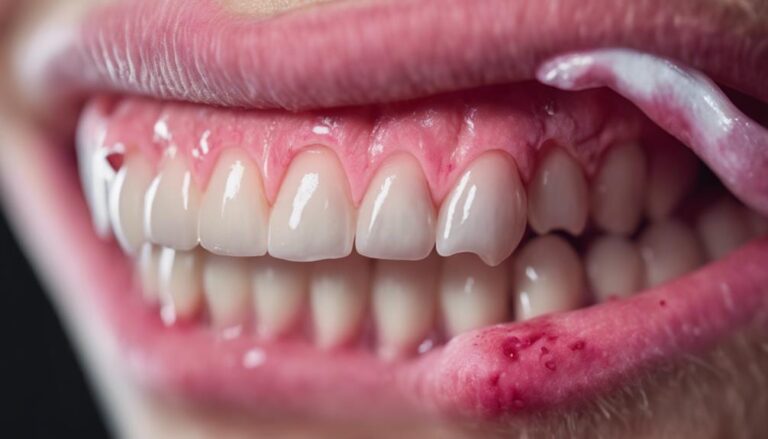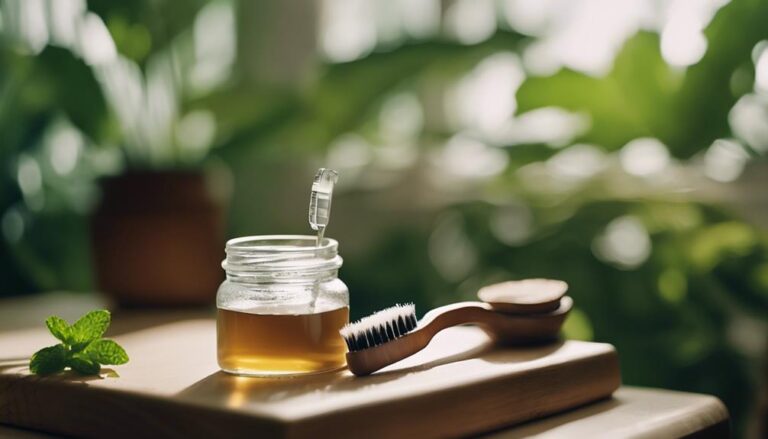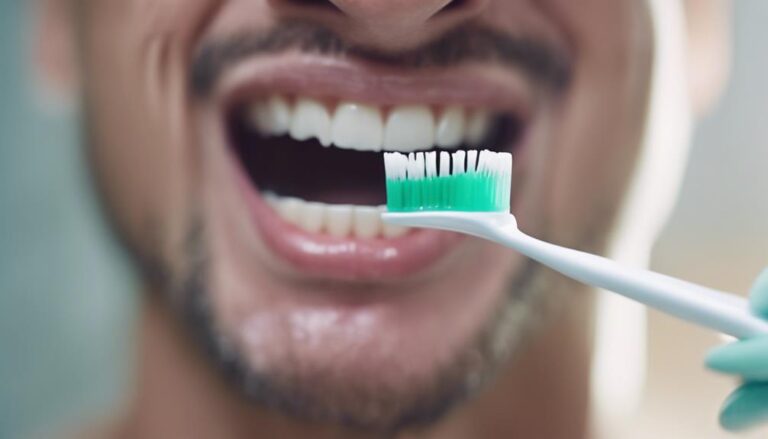Proper flossing techniques prevent bad breath by removing food particles and plaque that can host odor-causing bacteria. This helps keep your breath fresh and promotes oral health. Flossing daily disrupts plaque formation, reducing bacterial growth and the release of sulfur compounds that lead to bad breath. By incorporating flossing into your routine, you can effectively combat halitosis and maintain a healthy smile. Understanding the impact of flossing on oral hygiene and breath freshness is essential for overall dental wellness. Learning more about the importance of flossing techniques can enhance your oral care routine.
Key Takeaways
- Flossing removes food particles and plaque, reducing bacteria causing bad breath.
- Proper flossing prevents plaque buildup, crucial for fresh breath.
- Good flossing techniques combat halitosis by eliminating debris between teeth.
- Flossing aids in reducing oral bacteria, essential for breath freshness.
- Consistent flossing routine maintains oral hygiene, preventing bad breath.
Importance of Flossing for Halitosis
Flossing plays an important role in combating halitosis by removing food particles and plaque that can contribute to bad breath. Maintaining good oral hygiene through flossing can greatly impact breath freshness. When we skip flossing, we leave behind debris between our teeth that can lead to bacterial growth, causing an unpleasant odor in the mouth. The bacteria feed on these food particles, releasing volatile sulfur compounds that result in bad breath. By incorporating flossing into our daily oral care routine, we can effectively remove these particles and reduce the chances of bacterial buildup, thereby improving breath freshness.
Studies have shown that individuals who floss regularly tend to have better breath quality compared to those who neglect this essential step. Proper flossing techniques ensure that we reach areas between teeth where toothbrushes can’t access, further enhancing oral hygiene. By making flossing a habit, we can actively contribute to maintaining fresh breath and overall oral health.
Plaque Removal and Fresh Breath
The removal of plaque is essential for maintaining fresh breath and peak oral health. Plaque, a biofilm of bacteria that forms on teeth, not only causes cavities and gum disease but also contributes to bad breath. Here are four key ways plaque removal can lead to fresher breath and better oral health:
- Reduced Bacterial Growth: By effectively removing plaque through proper flossing techniques, the growth of odor-causing bacteria in the mouth is minimized, leading to fresher breath.
- Prevention of Gum Inflammation: Plaque accumulation can irritate gums, leading to inflammation and potential infection. Removing plaque helps maintain healthy gums, which are essential for fresh breath.
- Enhanced Saliva Stimulation: Proper plaque removal stimulates saliva production, which plays an important role in neutralizing acids, washing away food particles, and maintaining oral pH balance for fresher breath.
- Improved Tongue Hygiene: Removing plaque from teeth often involves cleaning the tongue as well. A cleaner tongue harbors fewer bacteria, reducing the likelihood of bad breath.
Incorporating these plaque removal practices into your oral hygiene routine can have a significant impact on the freshness of your breath and overall oral health.
Food Particle Elimination With Flossing
To effectively eliminate food particles between teeth, utilizing proper flossing techniques is crucial for maintaining excellent oral hygiene and preventing bad breath. Food debris trapped between teeth can lead to bacterial growth, causing bad breath. Flossing is highly effective in removing these food particles that brushing alone may not reach. By flossing daily, individuals can experience the benefits of improved breath freshness and overall oral health.
The efficiency of flossing in removing food debris is supported by research demonstrating its ability to reduce plaque buildup and prevent gum disease. Flossing reaches areas where a toothbrush cannot, ensuring a thorough cleaning process. The act of flossing not only dislodges food particles but also disrupts the formation of plaque, contributing to fresher breath.
Incorporating flossing into your daily oral hygiene routine is key to maintaining excellent oral health. By understanding the connection between flossing, food particle elimination, and breath freshness, individuals can enhance their overall oral care practices and promote long-term oral health.
Gum Health and Oral Malodor
Maintaining healthy gums is essential for combating oral malodor effectively. Gum health benefits play a critical role in preventing bad breath by addressing the root causes of oral malodor. Here are four key reasons why gum health is important for oral malodor prevention:
- Reduced Plaque Build-Up: Healthy gums are less likely to harbor plaque, which can contribute to bad breath when left unchecked.
- Proper Blood Circulation: Good gum health guarantees proper blood flow, promoting tissue repair and reducing the risk of infections that can cause oral malodor.
- Balanced Oral Microbiome: Healthy gums support a diverse and balanced oral microbiome, minimizing the growth of odor-causing bacteria.
- Decreased Risk of Gum Disease: By keeping gums healthy, the risk of gum disease is minimized, which in turn lowers the chances of experiencing oral malodor.
Bacteria Reduction via Flossing
Coming from the discussion on gum health and oral malodor, understanding how flossing aids in reducing bacteria is essential for thorough oral hygiene. Flossing plays an important role in bacteria reduction, which is essential for maintaining oral health. When we floss, we remove food particles and plaque from between our teeth, areas where toothbrushes can’t reach effectively. These leftover food particles can attract bacteria, leading to plaque buildup and potential oral health issues. By flossing daily, we disrupt the environment where bacteria thrive, reducing their numbers and preventing them from causing harm.
Research consistently shows that proper flossing techniques significantly decrease the amount of bacteria in the oral cavity. This reduction in bacteria not only helps prevent bad breath but also lowers the risk of developing cavities, gum disease, and other oral infections. Incorporating flossing into your daily oral hygiene routine is a simple yet effective way to promote overall oral health and maintain a healthy smile.
Interdental Cleaning Impact
Regular interdental cleaning practices, such as flossing, greatly impact overall oral health by reducing bacterial buildup and preventing various oral infections. Maintaining good interdental hygiene is vital for preventing bad breath and promoting a healthy mouth.
Here are four key points to bear in mind:
- Flossing Frequency: Consistent flossing, ideally once a day, is essential to remove food particles and plaque from between teeth where toothbrushes can’t reach effectively. This helps prevent the formation of plaque, which can lead to bad breath.
- Interdental Hygiene: In addition to flossing, using interdental brushes or water flossers can further enhance interdental cleaning. These tools help remove debris and bacteria from areas that are hard to reach with traditional floss.
- Prevention of Gum Disease: Proper interdental cleaning plays a significant role in preventing gum disease by reducing inflammation and the risk of developing periodontal problems.
- Overall Oral Health: By incorporating interdental cleaning into your daily routine, you can contribute to better oral health, fresher breath, and a reduced likelihood of experiencing dental issues.
Flossing and Tongue Coating
To effectively combat bad breath, incorporating regular flossing into your oral hygiene routine can help address the issue of tongue coating buildup.
Tongue coating, a thin layer of debris and bacteria that accumulates on the surface of the tongue, is a common culprit in causing bad breath. While flossing primarily targets the spaces between teeth, its benefits extend to the tongue as well. When you floss, you remove food particles and plaque that can contribute to the formation of tongue coating.
However, to thoroughly address this issue, incorporating tongue scraping into your oral hygiene routine is recommended. Tongue scraping involves gently dragging a specialized tool across the surface of the tongue to remove debris and bacteria.
Link Between Flossing and Bad Breath
Flossing plays an essential role in preventing bad breath by removing plaque and food particles from between teeth, where bacteria can thrive and contribute to oral malodor. Maintaining good oral hygiene through proper flossing techniques is vital for ensuring breath freshness.
Here are four key reasons why flossing is directly linked to combating bad breath:
- Bacteria Removal: Flossing helps eliminate bacteria that feed on food particles in hard-to-reach areas, reducing the chances of bacterial growth that causes bad breath.
- Plaque Prevention: Regular flossing prevents the buildup of plaque between teeth, which if left unchecked, can lead to gum disease and halitosis.
- Food Particle Elimination: Flossing dislodges food debris stuck between teeth, preventing the breakdown of these particles by bacteria that can produce foul-smelling gases.
- Gum Health: By removing irritants like plaque and debris, flossing promotes healthier gums, reducing the risk of gum disease-associated bad breath.
In essence, incorporating flossing into your daily oral hygiene routine is a fundamental step towards maintaining breath freshness and overall oral health.
Flossing Frequency for Fresh Breath
Maintaining excellent oral hygiene involves ensuring the appropriate frequency of utilizing floss for achieving and sustaining fresh breath. When it comes to flossing frequency, consistency is key. Ideally, flossing should be done at least once a day to remove food particles and plaque between teeth, preventing bad breath. Incorporating mouthwash benefits into your oral care routine can also help eliminate odor-causing bacteria, complementing the effects of flossing.
To emphasize the importance of flossing frequency and its impact on fresh breath, let’s take a look at the following table:
| Flossing Frequency | Benefits |
|---|---|
| Once a day | Removes plaque and food debris effectively |
| Twice a day | Enhances gum health and prevents bad breath |
| Thrice a day | Maximum plaque removal and ideal oral hygiene |
Flossing Technique and Odor Control
Implementing proper flossing techniques is crucial for effectively controlling oral odor. When it comes to breath improvement and maximizing flossing benefits, paying attention to how you floss can make a significant difference. Here are four key points to keep in mind:
- Technique Precision: Make sure you’re using the correct flossing technique. Properly wrapping the floss around each tooth in a C shape and moving it up and down helps remove food particles and plaque that can contribute to bad breath.
- Consistency is Key: Floss at least once a day to maintain excellent oral hygiene. Consistent flossing prevents the buildup of bacteria between teeth that can cause unpleasant odors.
- Reach Every Tooth: Ensure to floss between every tooth, including the back molars. Neglecting any areas can lead to bacterial growth and potential bad breath issues.
- Rinse Well: After flossing, rinse your mouth with an antimicrobial mouthwash to further reduce bacteria and keep your breath fresh throughout the day.
Flossing for Improved Breath
To guarantee fresher breath and peak oral health, skillfully maneuvering through the crevices of your teeth with floss is essential. Breath improvement is directly linked to effective flossing practices. By diligently flossing daily, you can greatly reduce the accumulation of plaque and food particles between your teeth, which are breeding grounds for bacteria responsible for oral odor.
To maximize breath improvement through flossing, consider these essential tips:
First, use a sufficient amount of floss (about 18 inches) to make sure you’re using a clean section between each tooth.
Next, gently glide the floss against the side of each tooth in a C shape to clean below the gumline.
Lastly, don’t forget to floss behind your back teeth as well.
These flossing benefits contribute not only to oral odor control but also to overall oral health. By incorporating these flossing tips into your daily routine, you can enjoy fresher breath and a healthier smile.
Flossing and Periodontal Health
Flossing regularly plays an important role in maintaining excellent periodontal health. As a dental professional, I’ve seen firsthand the impact of proper flossing on gum health and periodontal care. Here are four key reasons why flossing is vital for maintaining healthy gums and overall periodontal well-being:
- Plaque Removal: Flossing helps remove plaque from between the teeth and along the gumline, preventing the buildup of bacteria that can lead to gum disease.
- Prevention of Gingivitis: By removing food particles and plaque, flossing reduces the risk of gingivitis, which is the early stage of gum disease characterized by inflamed and bleeding gums.
- Strengthening Gum Tissues: Regular flossing stimulates the gums, promoting blood circulation and strengthening the gum tissues, which is essential for maintaining healthy gums.
- Prevention of Periodontitis: Flossing plays an essential role in preventing the progression of gingivitis to periodontitis, a more severe form of gum disease that can lead to tooth loss if left untreated.
Flossing for Morning Breath
For fresher morning breath, incorporating proper flossing techniques into your daily oral hygiene routine can be highly beneficial. Morning breath is often caused by bacteria accumulating in the mouth overnight, leading to unpleasant odors. By flossing before bed and in the morning as part of your routine, you can effectively remove food particles and plaque that contribute to bad breath.
Establishing flossing as an important step in your morning routine can greatly improve your dental health. Flossing helps to reach areas between teeth where toothbrushes can’t access, reducing the risk of gum disease, cavities, and bad breath. This simple practice can make a remarkable difference in how fresh your breath feels throughout the day.
Incorporating flossing into your morning routine not only combats bad breath but also promotes overall oral health. By making flossing a habit, you can prevent the buildup of bacteria and food debris that lead to unpleasant odors, ensuring a healthier mouth and fresher breath to kick start your day.
Flossing Effects on Breath
By effectively removing plaque and food particles, proper flossing techniques can greatly enhance breath freshness and overall oral hygiene. Flossing is an essential step in maintaining a healthy mouth, and its benefits extend beyond just preventing cavities. Here are four ways in which flossing positively impacts breath freshness and oral health:
- Plaque Removal: Flossing helps eradicate plaque buildup between teeth where toothbrushes can’t reach. This plaque harbors bacteria that produce foul-smelling compounds causing bad breath.
- Food Particle Elimination: Flossing dislodges food particles stuck between teeth, preventing them from decomposing and causing unpleasant odors.
- Gum Health Improvement: Proper flossing stimulates the gums, increasing blood flow and promoting overall gum health, which contributes to fresher breath.
- Prevention of Gum Disease: Regular flossing reduces the risk of gum disease, which can lead to chronic bad breath. Gum disease is often caused by the accumulation of bacteria in hard-to-reach areas that flossing targets effectively.
Consistent Flossing for Halitosis
To combat halitosis effectively, maintaining a consistent flossing routine is essential for excellent oral hygiene and fresh breath. Consistent flossing helps remove food particles and plaque between teeth, areas where a toothbrush cannot reach effectively. By doing so, it prevents the buildup of bacteria that can cause bad breath. Let’s explore the importance of flossing consistency further.
| Benefits of Consistent Flossing | How it Helps |
|---|---|
| Removes plaque and food debris | Reduces bacterial growth in the mouth |
| Prevents bad breath formation | Enhances overall oral hygiene |
Consistency in flossing is key to maintaining breath freshness as it disrupts the environment where odor-causing bacteria thrive. By incorporating flossing into your daily oral care routine, you can notably reduce the risk of halitosis. Remember, a clean mouth is a fresh mouth!
Frequently Asked Questions
Can Flossing Too Aggressively Cause Damage to the Gums?
Yes, aggressive flossing can harm gums. Proper flossing technique is essential to avoid damage. Aggressive flossing leads to gum recession, bleeding, and sensitivity. It’s important to be gentle yet thorough to maintain oral health.
Is There a Specific Type of Floss That Is Best for Preventing Bad Breath?
I find that the best flossing material for preventing bad breath is waxed floss due to its effectiveness in removing plaque and food particles. Flossing daily has a significant impact on oral hygiene and breath freshness.
Can Flossing Help With Bad Breath Caused by Certain Medical Conditions?
Flossing plays a key role in managing bad breath linked to medical conditions. Proper flossing techniques remove food particles and bacteria that contribute to chronic halitosis. Consistent flossing helps maintain oral health and combat bad breath related to medical issues.
Are There Any Side Effects of Flossing Too Frequently?
Flossing too frequently can lead to potential risks such as gum damage and irritation. Over flossing symptoms may include bleeding gums, receding gums, and increased sensitivity. Finding a balance is crucial for excellent oral health.
How Soon After Flossing Can One Expect to Notice an Improvement in Bad Breath?
After flossing, immediate freshness may be noticed, with long term benefits from consistent oral hygiene. It’s essential for maintaining fresh breath. Consistency in flossing contributes to overall oral health and prevents bad breath.
Conclusion
In summary, proper flossing techniques play a vital role in preventing bad breath by removing plaque, food particles, and reducing harmful bacteria in the mouth.
Consistent flossing not only improves gum health and reduces oral malodor but also contributes to fresher breath overall.
Remember, flossing is like a refreshing boost for your oral hygiene routine, so make sure to incorporate it daily for excellent results.






